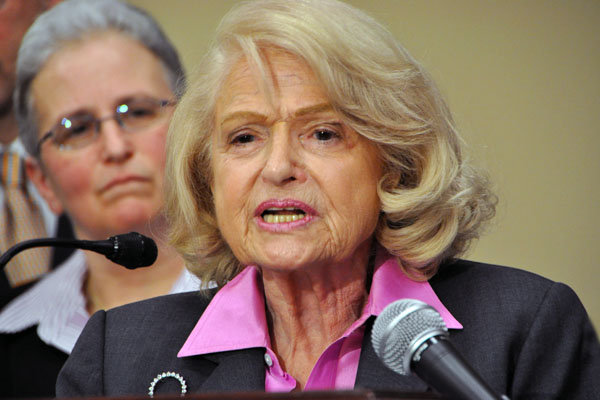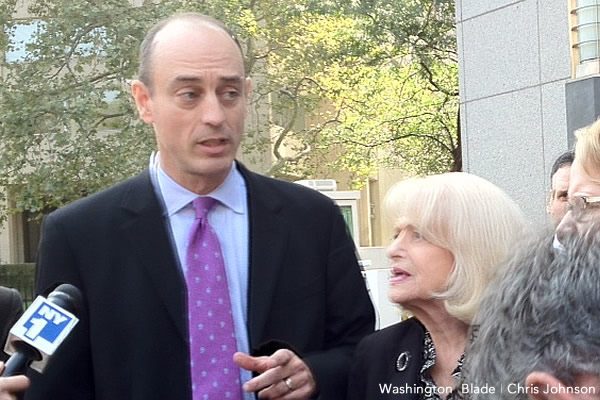National
GOP att’y strongly defends DOMA in N.Y. widow’s lawsuit
Second Circuit hears arguments in Windsor case in NYC


Edith ‘Edie’ Windsor testifies in her Federal Court case against DOMA. (Washington Blade file photo by Michael Key)
NEW YORK CITY — The House Republican attorney defending the Defense of Marriage Act in court took particular issue on Thursday with an octogenarian lesbian’s case against by the law by suggesting the timing and location of her marriage makes challenge invalid.
Paul Clement, a former U.S. solicitor general under the Bush administration, claimed before a federal appeals court that Edith Windsor doesn’t have a case because she married in Canada and her spouse, Thea Spyer, died in 2009 — two years before New York legalized same-sex marriage.
“The critical question isn’t 2012, the critical question is 2009,” Clement said.
Clement added that the issue of whether the marriage is sufficient for a challenge against DOMA should be brought to certification before the New York Court of Appeals, the highest state court in New York.
James Esseks, director of the ACLU’s Lesbian Gay Bisexual and Transgender Project, told the Blade after the oral arguments that Clement was “grasping at straws” when making these claims.
“There’s clear law in New York that New York in 2004 recognized the marriages of same-sex marriage performed in Canada and in other states that allowed same-sex couples to marry,” Esseks said.
Esseks acknowledged that the high court in New York hasn’t affirmed those marriages, but said that three lower courts have recognized those marriages as legitimate as well as the governor and attorney general.
“There’s just no debate about it; It’s quite clear,” Esseks said. “I think we heard from the court today — it’s difficult to make any predictions — but based on what I heard from the court, I don’t think that that’s how the court’s going to decide this question. They’re not going to duck the constitutionality of the Defense of Marriage by saying we’re not sure whether she’s actually married or not.”

Edith Windsor (right) speaks with the ACLU’s James Esseks to reporters following oral arguments in the Second Circuit (Washington Blade photo by Chris Johnson)
A three-judge panel on the appellate court heard from three attorneys during oral arguments in the case, known as Windsor v. United States. The lawsuit was filed by the American Civil Liberties Union on behalf of Windsor, who was forced to pay $363,000 in estate taxes upon the death of her spouse because of Section 3 of DOMA, which prohibits federal recognition of same-sex marriage.
The panel consisted of Chief Judge Dennis Jacobs, who was appointed by President George H.W. Bush; Judge Chester Straub, who was appointed by former President Bill Clinton; and Judge Christopher Droney, who was appointed by President Obama.
It’s the second time a federal appellate court has considered the constitutionality of DOMA. In April, the U.S. First Circuit of Appeals heard oral arguments in the consolidated case of Gill v. Office of Personnel Management and Commonwealth of Massachusetts v. Department of Health & Human Services. On May 31, the appeals issued a decision against DOMA as result of that consideration.
Lawyers presented before the Second Circuit starkly different views on the the Defense of Marriage Act on Thursday before judges reviewing Windsor’s challenge to the anti-gay law, which was passed by Congress in 1996.
In addition to questioning whether Windsor has standing, Clement, who’s DOMA in court on behalf of the House Republican-led Bipartisan Legal Advisory Group, drew upon the cases of Baker v. Nelson, a 1972 Minnesota case seeking the legalization of same-sex marriage that the U.S. Supreme Court declined to hear for lack of substantive federal question.
Clement acknowledged the case is 40 years old and times may have changed since then, but added, “The only thing that hasn’t changed is this court’s obligation to follow Supreme Court precedent.”
Plaintiffs in the case had another view. Roberta Kaplan, partner at Paul, Weiss, Rifkind, Wharton & Garrison LLP, argued against DOMA on behalf of Windsor, saying the law be struck down because states can already decide on their own what decisions to make about who can marry within their borders.
“The problem supposedly solved by uniformity is a problem that our federalist principles have already dealt with,” Kaplan said.
Kaplan added the case against DOMA isn’t about any federal right to marry because even with the law in place, gay couples haven’t been discouraged from marrying across the country, nor have they been discouraged from adopting.
Acting U.S. Assistant Attorney General Stuart Delery, who’s gay, assisted in the litigation against by presenting arguments on behalf of the Obama administration, saying the court should strike down because of the long history of discrimination against LGBT people — including the criminalization of homosexuality and being barred from military service.
“Sexual orientation is a fundamental part of person’s identity that says nothing about a person’s ability to contribute to society,” Delery said.
Questions from judges hit on several topics, although the questioning from didn’t reveal much in terms of what how they’d rule in the case. Many inquiries were posed about the extent to which gays and lesbians enjoy political power within the U.S. government. Opponents of DOMA have argued the anti-gay law is unconstitutional because gays and lesbians lack political power, but BLAG contends the LGBT community has significant influence.
Asked by Jacobs about whether the test of political power is whether gays and lesbians have any power at all or whether power is diminished, Clement replied, “I think it’s the former, and I don’t think it’s not a overwhelmingly difficult test. … It’s a matter of whether you get the attention of lawmakers.”
Clement pointed to a friend-of-the-court brief signed by 145 House Democrats filed in the case on behalf of plaintiffs as evidence that the LGBT community has influence over the political process as he asserted the LGBT community should look to the legislative process to repeal DOMA, saying “This is an issue that could be left to the Democratic process.”
But Kaplan said the 30 marriage amendments that passed in state throughout the country are evidence that gay and lesbians are politically powerless, even though she emphasized these amendments have no bearing on the case at hand against DOMA.
The degree of scrutiny under which laws related to sexual orientation should face before the courts also came up the during the hearing. Judges asked whether they should overturn DOMA on the basis that such laws should be subjected to strict scrutiny, or more intermediate level of heightened scrutiny or be examined under a rational basis review. The level of scrutiny they apply could have implications on court cases related to sexual orientation.
In the event the court decided to rule against DOMA, Clement said the court asked the court not to apply heightened scrutiny, noting it would be the first appellate court to do so because the First Circuit Court of Appeals when struck down DOMA in May under rational basis review.
Kaplan said she was arguing for the higher level of review called strict scrutiny as opposed to the more intermediate heightened scrutiny because “being gay or lesbian is closer to being African-American than being a woman.” Laws related to gender have been subjected to heightened scrutiny, but laws related to race have been subjected to strict scrutiny.
But Delery didn’t articulate the same view, saying he was arguing against DOMA on the basis that it violated heightened scrutiny. While he acknowledged arguments could be made that DOMA fails rational basis, he wouldn’t commit to saying that should be struck down under that standard.
Another question for Delery, which came from Droney, was why the Justice Department had appealed the Windsor to the Second Circuit even though his side won at the district court level when U.S. District Judge Barbara Jones ruled against the law. Delery provided a explanation, prompting Droney to quip that the Justice Department must have a predilection for seeking appellate court rulings in all cases, eliciting laughter from those in attendance at the hearing.
Yet another question was raised by Jacobs on whether withholding benefits from gay couples with the intention of saving money for the federal government is a good enough constitutional reason to keep DOMA in place. Kaplan denied this assertion and said saving money isn’t sufficient rationale unless it’s coupled with another justification.
But Clement pounced on these remarks in the rebuttal allotted to him at the end of the oral arguments, saying preserving federal coffers are absolutely a good reason to preserve DOMA and Congress was “preserving the scope of the benefits programs the way they’ve always been.”
Clement also during his rebuttal asserted that Congress has acted in other areas besides gay and lesbian with regard to marriage. He noted lawmakers have acted to protect against fraud, and, going back to the 19th Century, require states to prohibit polygamy so territories like Utah could enter into the union.
Following the oral arguments, Windsor appeared outside the court building to speak with reporters. Windsor, who recently turned 83, said, “I look forward to the day when the federal government will recognize the marriages of all Americans, and I am hopeful that this day will come during my lifetime.”
Windsor further invoked the memory her deceased spouse — with whom she shared a life for 40 years — saying she believes she’s was present in the court in spirit and “would have been so proud to see how far we’ve come.”
Now that oral arguments are done, judges will confer to determine the steps they’ll take in the case and the process that will lead to them making a decision. There’s no set time for when they have to make a ruling; it could be a matter of days, months or a year.
The ACLU’s Esseks said he wasn’t in a position to predict in what way judges would rule as a result of what was said during the oral arguments.
“Lawyers never want to predict the outcomes,” Esseks said. “There are some arguments that you come out of and you’re like I’m willing to take a guess here. This argument didn’t give me clear sense one way or the other. I wouldn’t be surprised about a win and I wouldn’t be shocked about a loss either.”
Windsor’s attorneys and the Justice Department have asked the Supreme Court to take up the Windsor case for consideration. If the Supreme Court accepts the request, the high court would take up jurisdiction of the lawsuit and the Second Circuit proceedings would be halted.
State Department
State Department releases annual human rights report
Antony Blinken reiterates criticism of Uganda’s Anti-Homosexuality Act

Secretary of State Antony Blinken on Monday once again reiterated his criticism of Uganda’s Anti-Homosexuality Act upon release of the State Department’s annual human rights report.
“This year’s report also captures human rights abuses against members of vulnerable communities,” he told reporters. “In Afghanistan, the Taliban have limited work opportunities for women, shuttered institutions found educating girls, and increasing floggings for women and men accused of, quote, ‘immoral behavior,’ end quote. Uganda passed a draconian and discriminatory Anti-Homosexuality Act, threatening LGBTQI+ individuals with life imprisonment, even death, simply for being with the person they loved.”
Ugandan President Yoweri Museveni last May signed the law, which contains a death penalty provision for “aggravated homosexuality.”
The U.S. subsequently imposed visa restrictions on Ugandan officials and removed the country from a program that allows sub-Saharan African countries to trade duty-free with the U.S. The World Bank Group also announced the suspension of new loans to Uganda.
Uganda’s Constitutional Court earlier this month refused to “nullify the Anti-Homosexuality Act in its totality.” More than a dozen Ugandan LGBTQ activists have appealed the ruling.
Clare Byarugaba of Chapter Four Uganda, a Ugandan LGBTQ rights group, on Monday met with National Security Council Chief-of-Staff Curtis Ried. Jay Gilliam, the senior LGBTQI+ coordinator for the U.S. Agency for International Development, in February traveled to Uganda and met with LGBTQ activists who discussed the Anti-Homosexuality Act’s impact.
“LGBTQI+ activists reported police arrested numerous individuals on the basis of their sexual orientation or gender identity and subjected many to forced anal exams, a medically discredited practice with no evidentiary value that was considered a form of cruel, inhuman, and degrading treatment and could amount to torture,” reads the human rights report.
The report, among other things, also notes Ugandan human rights activists “reported numerous instances of state and non-state actor violence and harassment against LGBTQI+ persons and noted authorities did not adequately investigate the cases.”
Report highlights anti-LGBTQ crackdowns in Ghana, Hungary, Russia
Ghanaian lawmakers on Feb. 28 approved the Promotion of Proper Human Sexual Rights and Ghanaian Family Values Bill. The country’s president, Nana Akufo-Addo, has said he will not sign the measure until the Ghanaian Supreme Court rules on whether it is constitutional or not.
The human rights report notes “laws criminalizing consensual same-sex sexual conduct between adults” and “crimes involving violence or threats of violence targeting lesbian, gay, bisexual, transgender, queer or intersex persons” are among the “significant human rights issues” in Ghana.
The report documents Hungarian Prime Minister Viktor Orbán and members of his right-wing Fidesz party’s continued rhetoric against “gender ideology.” It also notes Russia’s ongoing crackdown against LGBTQ people that includes reports of “state actors committed violence against LGBTQI+ individuals based on their sexual orientation or gender identity, particularly in Chechnya.”
The report specifically notes Russian President Vladimir Putin on July 24 signed a law that bans “legal gender recognition, medical interventions aimed at changing the sex of a person, and gender-affirming care.” It also points out Papua New Guinea is among the countries in which consensual same-sex sexual relations remain criminalized.

The Cook Islands and Mauritius in decriminalized homosexuality in 2023.
The report notes the Namibia Supreme Court last May ruled the country must recognize same-sex marriages legally performed outside the country. The report also highlights the Indian Supreme Court’s ruling against marriage equality that it issued last October. (It later announced it would consider an appeal of the decision.)
Congress requires the State Department to release a human rights report each year.
The Biden-Harris administration in 2021 released a memorandum that committed the U.S. to promoting LGBTQ+ and intersex rights abroad.
The full report can be read here.
National
Same-sex couples vulnerable to adverse effects of climate change
Williams Institute report based on Census, federal agencies

A new report by the Williams Institute at the UCLA School of Law finds that same-sex couples are at greater risk of experiencing the adverse effects of climate change compared to different-sex couples.
LGBTQ people in same-sex couple households disproportionately live in coastal areas and cities and areas with poorer infrastructure and less access to resources, making them more vulnerable to climate hazards.
Using U.S. Census data and climate risk assessment data from NASA and the Federal Emergency Management Agency, researchers conducted a geographic analysis to assess the climate risk impacting same-sex couples. NASA’s risk assessment focuses on changes to meteorological patterns, infrastructure and built environment, and the presence of at-risk populations. FEMA’s assessment focuses on changes in the occurrence of severe weather events, accounting for at-risk populations, the availability of services, and access to resources.
Results show counties with a higher proportion of same-sex couples are, on average, at increased risk from environmental, infrastructure, and social vulnerabilities due to climate change.
“Given the disparate impact of climate change on LGBTQ populations, climate change policies, including disaster preparedness, response, and recovery plans, must address the specific needs and vulnerabilities facing LGBTQ people,” said study co-author Ari Shaw, senior fellow and director of international programs at the Williams Institute. “Policies should focus on mitigating discriminatory housing and urban development practices, making shelters safe spaces for LGBT people, and ensuring that relief aid reaches displaced LGBTQ individuals and families.”
“Factors underlying the geographic vulnerability are crucial to understanding why same-sex couples are threatened by climate change and whether the findings in our study apply to the broader LGBTQ population,” said study co-author Lindsay Mahowald, research data analyst at the Williams Institute. “More research is needed to examine how disparities in housing, employment, and health care among LGBT people compound the geographic vulnerabilities to climate change.”
Read the report
Federal Government
Lambda Legal praises Biden-Harris administration’s finalized Title IX regulations
New rules to take effect Aug. 1

The Biden-Harris administration’s revised Title IX policy “protects LGBTQ+ students from discrimination and other abuse,” Lambda Legal said in a statement praising the U.S. Department of Education’s issuance of the final rule on Friday.
Slated to take effect on Aug. 1, the new regulations constitute an expansion of the 1972 Title IX civil rights law, which prohibits sex-based discrimination in education programs that receive federal funding.
Pursuant to the U.S. Supreme Court’s ruling in the landmark 2020 Bostock v. Clayton County case, the department’s revised policy clarifies that discrimination on the basis of sexual orientation and gender identity constitutes sex-based discrimination as defined under the law.
“These regulations make it crystal clear that everyone can access schools that are safe, welcoming and that respect their rights,” Education Secretary Miguel Cardona said during a call with reporters on Thursday.
While the new rule does not provide guidance on whether schools must allow transgender students to play on sports teams corresponding with their gender identity to comply with Title IX, the question is addressed in a separate rule proposed by the agency in April.
The administration’s new policy also reverses some Trump-era Title IX rules governing how schools must respond to reports of sexual harassment and sexual assault, which were widely seen as imbalanced in favor of the accused.
Jennifer Klein, the director of the White House Gender Policy Council, said during Thursday’s call that the department sought to strike a balance with respect to these issues, “reaffirming our longstanding commitment to fundamental fairness.”
“We applaud the Biden administration’s action to rescind the legally unsound, cruel, and dangerous sexual harassment and assault rule of the previous administration,” Lambda Legal Nonbinary and Transgender Rights Project Director Sasha Buchert said in the group’s statement on Friday.
“Today’s rule instead appropriately underscores that Title IX’s civil rights protections clearly cover LGBTQ+ students, as well as survivors and pregnant and parenting students across race and gender identity,” she said. “Schools must be places where students can learn and thrive free of harassment, discrimination, and other abuse.”
-

 South America4 days ago
South America4 days agoDaniel Zamudio murderer’s parole request denied
-

 Maryland4 days ago
Maryland4 days agoMontgomery County police chief discusses arrest of trans student charged with planned school shooting
-

 Commentary5 days ago
Commentary5 days agoWorld ‘isn’t much different today’
-

 Theater4 days ago
Theater4 days ago‘Amm(i)gone’ explores family, queerness, and faith












